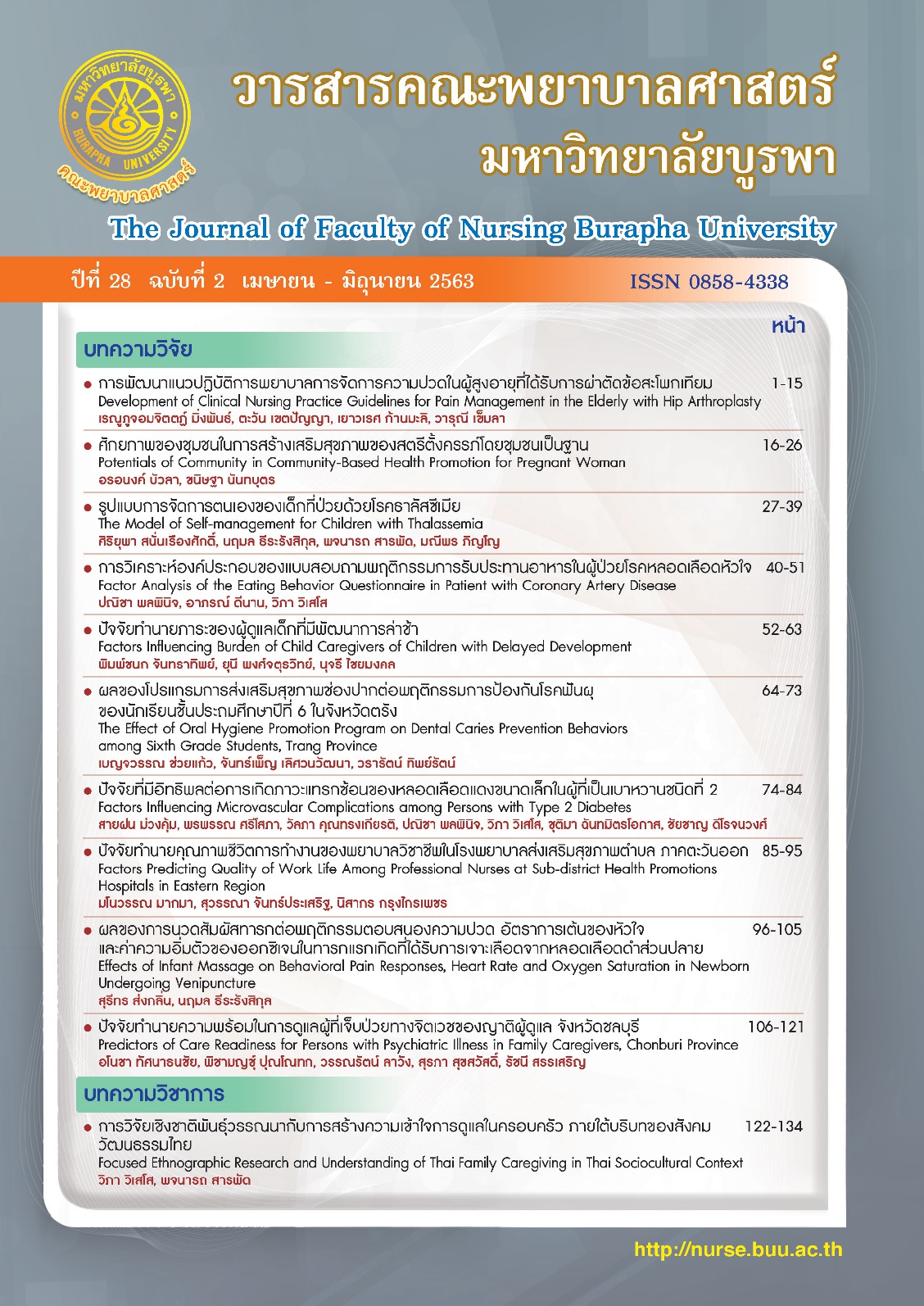การวิจัยเชิงชาติพันธุ์วรรณนากับการสร้างความเข้าใจการดูแล ในครอบครัวภายใต้บริบทของสังคมวัฒนธรรมไทย
คำสำคัญ:
การวิจัยเชิงชาติพันธุ์วรรณนา, การดูแลในครอบครัว, บริบทของสังคมวัฒนธรรมไทยบทคัดย่อ
การวิจัยเชิงชาติพันธุ์วรรณนาเป็นวิธีการวิจัยเชิงคุณภาพที่มุ่งอธิบายวิถีชีวิตและวัฒนธรรมของคนในสังคมใด
สังคมหนึ่ง สามารถศึกษาได้ทั้งในระดับมหภาคและจุลภาค โดยระดับมหภาคเป็นการศึกษาวัฒนธรรมในภาพกว้าง
ส่วนระดับจุลภาคเป็นการศึกษาวัฒนธรรมที่มีจำเพาะโดยเป็นการศึกษาวัฒนธรรมในกลุ่มย่อย ปัจจุบันการวิจัยเชิง
ชาติพันธุ์วรรณนาระดับจุลภาคได้ถูกนำมาใช้ในการวิจัยทางการพยาบาลมากขึ้น เพราะช่วยให้เข้าใจถึงวิถีชีวิตและบริบท
ทางสังคมวัฒนธรรมของกลุ่มบุคคลที่มีความแตกต่างกัน และเกี่ยวข้องกับมุมมองของความเจ็บป่วยและพฤติกรรม
ทางสุขภาพ ทั้งนี้ ในบริบทของสังคมไทย ครอบครัวเป็นหน่วยทางสังคมที่มีความสำคัญ สมาชิกในครอบครัวที่มี
ความรักใคร่ผูกพัน มีการช่วยเหลือดูแลซึ่งกันและกัน เมื่อสมาชิกในครอบครัวคนใดคนหนึ่งเจ็บป่วย จะมีผลกระทบต่อ
ระบบครอบครัว สมาชิกคนอื่นในครอบครัวมักจะเป็นผู้ให้การดูแล ซึ่งจะมีผลต่อการเจ็บป่วยด้วย ดังนั้น การศึกษาเพื่อ
ทำความเข้าใจบริบททางสังคมวัฒนธรรมของแต่ละครอบครัวที่มีความแตกต่างกันโดยใช้การวิจัยเชิงชาติพันธุ์วรรณนา
จึงมีความสำคัญในการพัฒนาการให้บริการทางสุขภาพที่สอดคล้องกับความต้องการของแต่ละครอบครัว อันจะส่งผลต่อ
การดำรงไว้ซึ่งความสมดุลและความผาสุกของครอบครัว บทความนี้ มีวัตถุประสงค์เพื่ออธิบายความหมายและประเภท
ของการวิจัยเชิงชาติพันธุ์วรรณนา การวิจัยทางการพยาบาลที่ศึกษาโดยใช้รูปแบบของวิจัยเชิงชาติพันธุ์วรรณนา และ
การวิจัยเชิงชาติพันธุ์วรรณนากับการสร้างความเข้าใจการดูแลในครอบครัวตามบริบทของสังคมวัฒนธรรมไทย ซึ่งจะเป็น
แนวทางที่ช่วยให้พยาบาลเกิดความเข้าใจในบริบทสังคมและวัฒนธรรมที่มีอิทธิพลต่อการดูแลในครอบครัวไทย
เอกสารอ้างอิง
actions: Outgrowths of the family
caregiver’s conceptions of care. Nursing and
Health Sciences, 1-8. DOI: 10.1111/nhs.
12077.
Chirawatkul, S. (2015). Qualitative research
in health science (3rd ed.). Bangkok:
Wittayaphat. [In Thai]
Chompikul, J. (2009). Relationship in Thai families.
Nakhon Pathom: ASEAN Institute for
Health Development, Mahidol University.
[In Thai]
Chooto, N. (2008). Qualitative research (4th ed.).
Bangkok: Printpro. [In Thai]
Crawford, C.F. (2010). Duty, obligation and
prostitution: How family matters in entry
into and exit from prostitution in Thailand.
In P.H. De Neui (Eds.), Family and faith
in Asia: The missional impact of social
networks (pp.77-99). Pasadena: William
Carey Library.
Cruz, E.V., & Higginbottom, G. (2013). The use of
focused ethnography in nursing research.
Nurse Researcher, 20(4), 36-43.
Friedman, M.M., Bowden, V.R., & Jones, E.G. (2003).
Family nursing: research, theory & practice
(5th ed). Upper Saddle River NJ: Prentice
Hall.
Hallett, R.E. & Barber, K. (2014). Ethnographic
research in a cyber-era. Journal of
Contemporary Ethnography, 4(3), 306-330.
Hermanns, M. & Mastel-Smith, B. (2012). Caregiving:
A qualitative concept analysis. The
Qualitative Report, 17(1), 1-18.
Higginbottom, G.M., Pillay, J.J., & Boadu, N.Y. (2013).
Guidance on performing focused
ethnographies with an emphasis on
healthcare research. The Qualitative
Report, 18(17), 1-16.
Khungtumneam, K. (2014). Ethnography research
for nursing service system in ASEAN. Journal
of The Royal Thai Army Nurses, 15(1), 29-35.
[In Thai]
Klangkong, M., Singha, S., & Bantoms, P. (2011).
Spiritual health of caregiver in case of end
stage cancer of muslim patients. Al-Hikmah
Journal of Yala Islamic University, 1(2),
37-47. [In Thai]
Kongsuwan, W., Chaipetch, O., & Matchim, Y.
(2012). Thai Buddhist families’ perspective
of a peaceful death in ICUs. Nursing in
Critical Care, 17(3), 151-159. doi: http://dx.
doi.org/10.1111/j.1478-5153.2012.00495.x
Lin, J. & Yi, C. (2013). A comparative analysis of
intergenerational relations in East Asia.
International Sociology, 28(3), 297-315.
Matchim, Y. (2009). Hospice care: A cross-cultural
comparison between the United States
and Thailand. Journal of Hospice and
Palliative Nursing, 11(5), 262-268.
Mehta, A., Cohen, R., & Chan, L. S. (2009). Palliative
care: A need for a family systems approach.
Palliative and Supportive Care, 7(1),
235-243.
Nilmanat, K. (2012). The end of life care. Songkla:
Chanmuang Press. [In Thai]
Panprasert, P. (2014). Family’s social support in
promotion for the youth’s moral behavior
in Kanchanaburi Province. Dhonburi
Rajabhat University: Offce of Academic
Resources and Information Technology.
[In Thai]
Photisita, C. (2009). Science and art of qualitative
research (4th ed.). Bangkok: Amarin Printing
and Publishing. [In Thai]
Robinson, S.G. (2013). The Relevancy of
ethnography to nursing research. Nursing
Science Quarterly, 26(1), 14-19.
Satsanguan, N. (2015). Qualitative research in
anthropology (7 th ed.). Bangkok:
Chulalongkorn University Press. [In Thai]
Singchongchai, P. (2009). Principles and using
qualitative research in nursing and health
(3rd ed.). Songkhla: Chanmuang. [In Thai]
Somanusorn, S., Hatthakit, U., & Nilmanat, K. (2011).
Caring for a relative at the end of life to die
peacefully in the Thai Buddhist culture. The
Journal of Faculty of Nursing Burapha
University, 19(2), 28-41. [In Thai]
Sowattanangoon, N., Kotchabhakdi, N., & Petrie,
K.J. (2009). The influence of Thai culture
on diabetes perceptions and management.
Diabetes Research and Clinical Practice,
84(1), 245-251.
Spradley, J. (1980). Participant observation.
Orlando: Holt, Rinehart, & Winston.
Srichantaranit, A., Chontawan, R., Yenbut, J., Ray,
L., Laohaprasittiporn, D., & Wanitkun, S.
(2010). Thai families’ caring practices for
infants with congenital heart disease prior
to cardiac surgery. Pacifc Rim International
Journal of Nursing Research, 14(1), 61-78.
Wongwiwattananukit, S. (2007). Dictionary of
research and statistics (2 nd ed.).
Chulalongkorn University Press. [In Thai]
Wright, L. M., & Leahey, M. (2013). Nurses and
families: A Guide to family assessment
and intervention (6th ed.). Philadelphia,
PA: FA Davis Company





